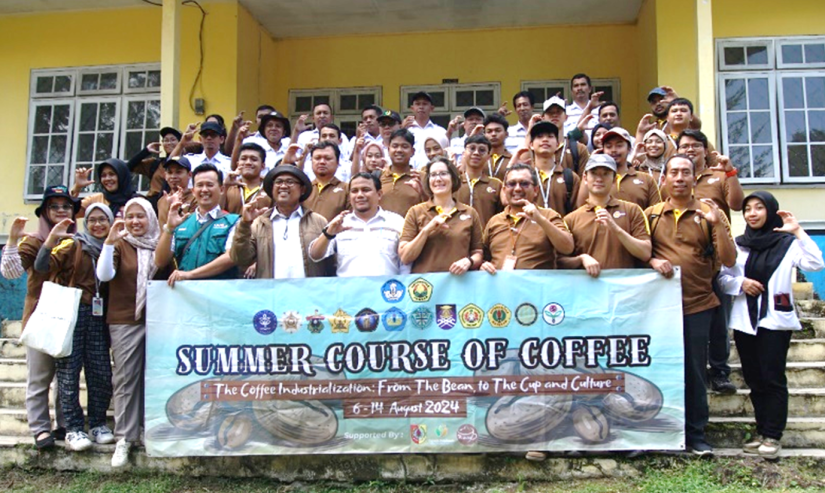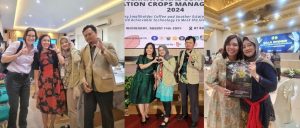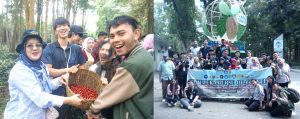
From August 5 to 14, 2024, Universitas Jember hosted the Summer Course of Coffee 2024, a collaborative program involving various international institutions, including the University of California Davis (UC Davis) and the Indonesian Coffee and Cocoa Research Institute (ICCRI). This program was designed to explore the potential of Indonesian coffee, particularly in the Jember region, and to strengthen the relationship between academics and practitioners in the coffee industry.
The Faculty of Agricultural Technology at Universitas Gadjah Mada sent one of its graduate students in Plantation Products Technology, Rachma Widya Puspita, to participate in this international summer course on coffee. In addition, Universitas Gadjah Mada also sent Dr. Widiastuti Setyaningsih as a mentor for this event, demonstrating UGM’s commitment to supporting academic development and international collaboration.
Opening Ceremony and Educational Visits The activities began with an opening ceremony on August 5, 2024, attended by the Vice Rector of Universitas Jember and representatives from UC Davis. The participants were invited to visit various top facilities at Universitas Jember, including the Center for Development of Advanced Sciences and Technology (CDAST) and Agrotechnopark, where they were introduced to modern agricultural technology and practices applied in coffee and other crop development.
Educational Sessions and Discussions During the program, participants gained in-depth insights into the coffee industry from both local and international perspectives. On August 6, Prof. Tonya Kuhl from UC Davis delivered a lecture on “Coffee Industrialization in the USA,” discussing the dynamics of coffee consumption in the United States and the cupping standards implemented by the Specialty Coffee Association of America (SCAA). This session was followed by a presentation from Mr. Noor Ariefandie from ICCRI, who discussed the challenges and opportunities in the Indonesian coffee industry, particularly in the development of smallholder coffee plantations.
On the same day, Mrs. Asmak Afriliana from the Faculty of Agricultural Technology, Universitas Jember, presented innovations in coffee processing, including the production process of artificial civet coffee (Kopi Luwak) that resulted in a product with distinctive flavor characteristics and high cupping scores.
Cultural Exploration and Coffee Tourism In addition to educational sessions, participants were also taken on visits to various important coffee-related locations in Jember and its surroundings. They had the opportunity to see the coffee processing directly at Silo Ketakasi Coffee and Art, visit coffee plantations in Bondowoso, and learn coffee processing techniques at Raisa Coffee School Center. These activities provided comprehensive insights into the coffee industry from upstream to downstream, including the importance of proper harvesting and processing techniques to produce high-quality coffee.
Participation and Awards at the International Conference As part of the program, Rachma Widya Puspita also participated in the International Conference Plantation Crops Management (PCM) 2024 held on August 14, 2024. At the conference, she presented her research abstract titled “Effect of Sterilization on The Flavor of Ready-to-drink Cold Brew Coffee From Ijen Arabica,” which discussed the development of a new product in Ijen Village that ensures the safety of beverage consumption and extends its shelf life.
In addition, Rachma Widya Puspita and her team won the Best Group Award at the Summer Course of Coffee 2024. Their presentation, which linked the role of coffee plantations to the achievement of Sustainable Development Goals (SDGs), specifically SDG 1 (No Poverty) and SDG 5 (Gender Equality), became a highlight. They highlighted how coffee plantations can support poverty alleviation through cooperatives that ensure fair prices for local farmers and promote gender equality in the recruitment of workers in the coffee industry.
Conclusion The Summer Course of Coffee 2024 successfully combined education, research, and practical experience, enriching the participants’ understanding of the coffee industry. Through this international collaboration, Universitas Jember not only strengthened its position as a center of excellence in coffee research but also played an active role in supporting the sustainability and welfare of the coffee farming community in Indonesia. UGM’s participation, both through its mentor and students, is a testament to its commitment to academic development and synergy between educational institutions.
Author: Rachma Widya Puspita


